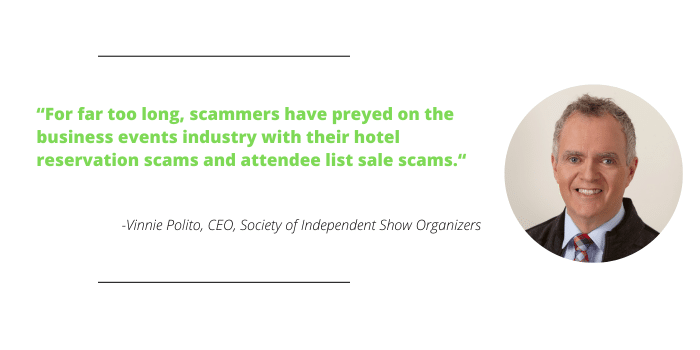As an industry that relies heavily on trade shows, the promotional products world has had to contend in recent years with scammers trying to pose as organizations or businesses. Previously, organizations like PPAI had little at their disposal to battle these scammers beyond warning members to be cautious.
Now, the Federal Trade Commission (FTC) is focusing on such crimes through the Government and Business Impersonation Rule.
- The rule is meant to target scammers who manipulate victims into giving them money or personal information by impersonating businesses or organizations.
- Direct monetary relief is possible for victims if implemented as intended.
- A number of trade associations and organizations who hold trade shows had advocated the FTC to prioritize these crimes. Nicole Bowman, VP of marketing and communications at the International Association of Exhibitions and Events (IAEE), testified in May 2023 on the prevalence of such scams.
“Scammers targeting the business events industry unfairly harm the small businesses, entrepreneurs, exhibitors and nonprofit organizations that we work tirelessly to support,” says Marsha Flanagan, IAEE president and CEO. “That’s why our industry was front and center in advocating for this important new rule, and we commend the FTC for finalizing it with a unanimous vote.”
Common Trade Show Scams
Impersonation scams can involve any number of strategies or victims, but a particularly common form affecting the promo industry is scams centered around trade show events. A frequent tactic includes the following steps and motivations:
- Scammers reach out to potential exhibitors and attendees via email.
- They fraudulently claim to have the show’s attendee list and offer to sell it.
- The goal is to deceive attendees and exhibitors into sharing personal and/or financial information for malicious purposes.

As big events and trade shows – like The PPAI Expo– approach, attendees are inundated with a number of necessary emails ranging from various registrations and hotel or flight confirmations to personal and business meetings.
- Scammers are attempting to prey on email fatigue, assuming they will catch victims who hurriedly click through or follow instructions.
PPAI warns all members that if you encounter emails that offer attendee lists or ask something of you that sounds suspicious, do not engage with the sender.
- Do not respond.
- Do not even unsubscribe, as that may confirm to the scammer that they have reached a valid email address.
- PPAI encourages you to follow your organization’s procedures for reporting spam.
The Government And Business Impersonation Rule
As scams of all forms have become increasingly sophisticated and commonplace, so often the onus has fallen squarely on potential victims to avoid falling prey. While the Government And Business Impersonation Rule will not eliminate such scam attempts, it is the strongest legislation that has been put in place to date and will give potential victims hope of recouping their losses.
“For far too long, scammers have preyed on the business events industry with their hotel reservation scams and attendee list sale scams,” says Vinnie Polito, Society of Independent Show Organizers CEO. “Now the FTC will have stronger tools to go after those who target our industry, and we strongly encourage the agency to do just that.”
The FTC will now be empowered to directly file federal court cases intended to force impersonators to return the money they received as a result of a scam. Direct monetary relief can be sought from scammers that:
- Use business logos when communicating with consumers.
- Use lookalike email addresses or websites that rely on misspellings of a company’s name.
- Falsely imply business affiliation by using terms that are known to be affiliated with a business.


